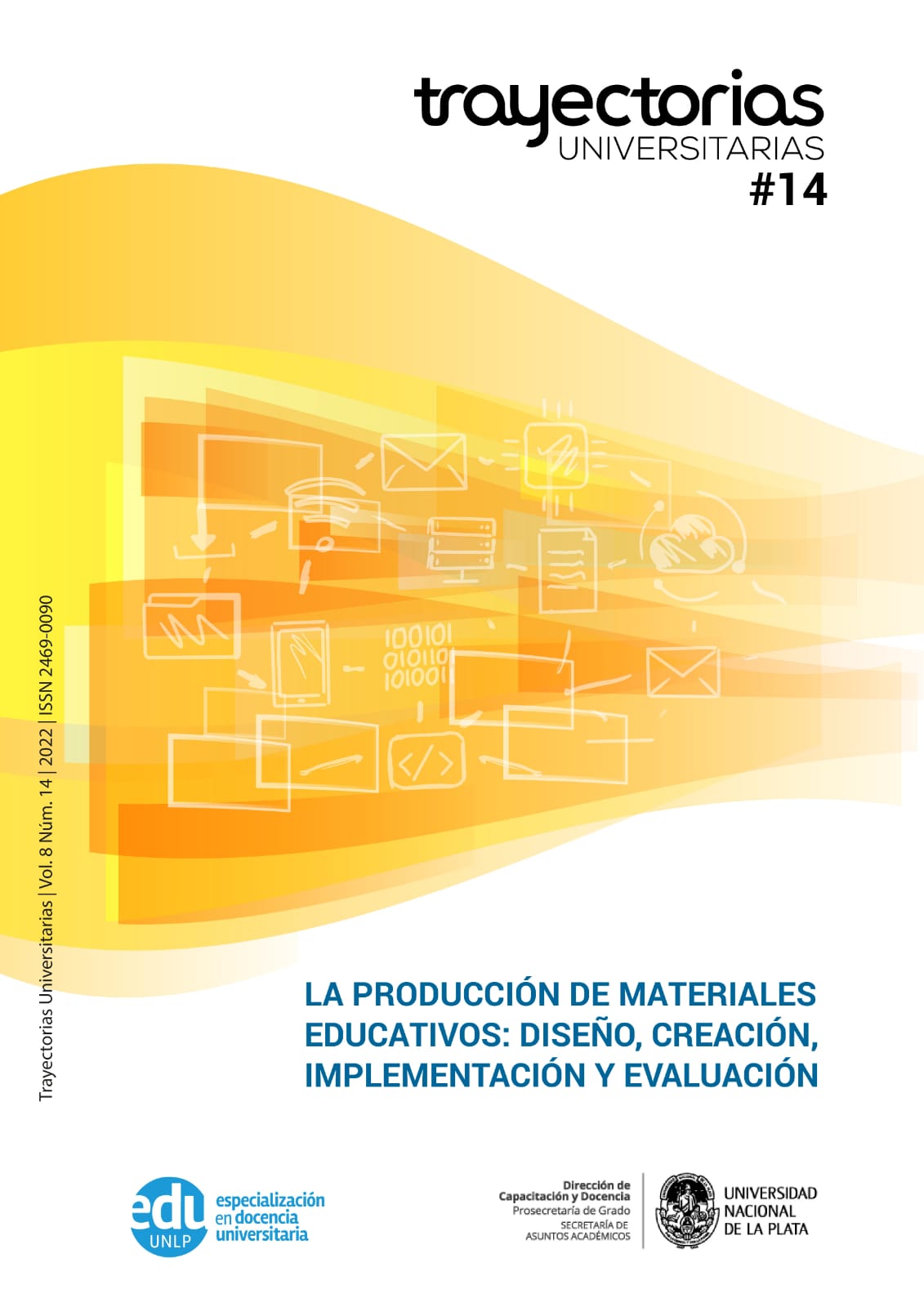What values encrypt the success of students in virtual training programs?
DOI:
https://doi.org/10.24215/24690090e103Keywords:
Ethical values of the student, Virtuality, online education socia, Social Representa, social representations, collective imaginariesAbstract
The purpose of this work is to determine the fundamental values required to achieve academic success in activities in virtual learning scenarios, based on an investigation of the concurrent social representations in undergraduate students, 2 years after the forced start of activities in hotline due to the COVID 19 pandemic.
Using the qualitative, ethnographic, descriptive research methodology, applying an open, unstructured questionnaire via virtual, to an intentional and non-probabilistic sample of the population of students of the Universidad de Los Andes, it was possible to carry out the collective construction through the graphic representation of the values in a text cloud, to analyze the results and contrast them with the theoretical positions, generating a reflection inherent to the motivation for university achievement.
Downloads
Metrics
References
Bourdieu, P. (2007) [1987], Espacio social y poder simbólico en: Bourdieu, Pierre. Cosas Dichas, Barcelona: Gedisa.
Castariodis, C. (1983) Institución Imaginario de la Sociedad. España,Tusquets.
Cegarra, J. (2012). Fundamentos Teórico Epistemológicos de los Imaginarios Sociales. Cinta de moebio, 1,13.
Cero, E. t. (2018). Cómo crear una nube de tags y sus usos en el aula. Obtenido de https://revista.educaciontrespuntocero.com/
Ciceron, (1960) Tusculanas ed. G. Fohlen, Les Belles Lettres,
Chica, F. (2009). La concepción de la entidad virtual desde la perspectiva de la inteligencia. Itinerario Educativo , 157-175.
Cortés, J., Silva, A., & Sandoval, M. (2019). Aplicación móvil adaptativa a entornos web para la gestión del tiempo y el desarrollo de la autoeficacia en estudiantes de programas en educación a distancia y virtual. En E. Serna, Investigación Formativa en Ingeniería (págs. 13-21). Medellín: Instituto Antioqueño de Investigación.
Deci, E., & Ryan, R. (1985). The general causality orientations scale: Self-determination in personality. Journal of Research in Personality, 109-134.
Durand, G. (1994). Lo imaginario. Barcelona: Ediciones del Bronce, 2000.
Floridi, L. (2014). The Fourth Revolution. How the Infosphere is Reshaping Human Reality. Oxford, RU: Oxford University Press.
García Canclini, N. (1997) "Imaginarios Urbanos" Buenos Aires: Eudeba.
Garcia, M. (1992) Lecciones preliminares de Filosofía. Editores mexicanos unidos. ISBN 968-15-0064-4.
Gardner, H. (1998). A Reply to Perry D. Klein's 'Multiplying the problems of intelligence by eight. Canadian Journal of Education , 96-102.
Gómez, P. (2001). Imaginarios sociales y análisis semiótico. Una aproximación a la construcción narrativa de la realidad. Cuadernos revista de la facultad de humanidades y ciencias sociales, 195-209.
Guzmán, J. (2018). Relacion entre la actitud hacia el aprendizaje en línea y la educación virtual. http://repositorio.unsa.edu.pe/bitstream/handle/UNSA/8316/EDMgumejy.pdf?sequence=1&isAllowed=y: Universidad de San Agustín Arequipa.
Lévy, P. (1999). ¿Qué es lo virtual? . Ibérica: Barcelona.
Magaz, M. (2008). La virtualización – Apuntes sobre el libro de Pierre Levy. Obtenido de https://bit.ly/2E1gHci
Moscovici, S. (1979). El psicoanálisis, su imagen y su público, Huemal. Buenos Aires. (Trabajo original publicado en 1961).
Moscovici, S. (1981). "On social representation". En J.P. Forgas (Comp.). Social cognition. Perspectives in everyday life, Academic Press. Londres.
Moscovici, S. (1984). "The phenomenon of social representations". En R.M. Farr y S. Moscovici (Comps.). Social Representations, Cambridge University Press. Cambridge.
Ortiz, K., & Castañeda, G. (s.f.). Obtenido de La transformación de los imaginarios en educación virtual: https://bit.ly/2E1gHci
Orozco, J ( 2015) Valores virtuales. Horizonte de la Ciencia 5 (9) diciembre 2015 FE/UNCP. ISSN (Impreso): 2304-4330/ ISSN (En Línea): 2413-936X. 86-94. file:///C:/Users/profe/Downloads/Dialnet-ValoresVirtuales-5420547.pdf
Silva, A. (2006). Imaginarios Urbanos. Bogotá. Arango editores.
Viégas, F.; Wattenberg, M. (2008) Timelines tag clouds and the case for vernacular visualization. Interactions, 2008, vol. 15, n. 4, pp. 49-52.
Downloads
Published
How to Cite
Issue
Section
License
Copyright (c) 2022 Elisabeth Benítez, Raymond Marquina

This work is licensed under a Creative Commons Attribution-NonCommercial-ShareAlike 4.0 International License.
La aceptación de un original por parte de la revista implica la cesión no exclusiva de los derechos patrimoniales de los/as autores/as en favor del editor, quien permite la reutilización, luego de su edición (postprint), bajo una Licencia Creative Commons Atribución-NoComercial-CompartirIgual 4.0 Internacional (CC BY-NC-SA 4.0).
Acorde a estos términos, el material se puede compartir (copiar y redistribuir en cualquier medio o formato) y adaptar (remezclar, transformar y crear a partir del material otra obra), siempre que a) se cite la autoría y la fuente original de su publicación (revista y URL de la obra), b) no se use para fines comerciales y c) se mantengan los mismos términos de la licencia.
La cesión de derechos no exclusivos implica que luego de su edición (postprint) en Trayectorias Universitarias los/as autores/as pueden publicar su trabajo en cualquier idioma, medio y formato; en tales casos, se solicita que se consigne que el material fue publicado originalmente en esta revista.
Tal cesión supone, también, la autorización de los/as autores/as para que el trabajo sea cosechado por SEDICI, el repositorio institucional de la Universidad Nacional de La Plata, y sea difundido en las bases de datos que el equipo editorial considere adecuadas para incrementar la visibilidad de la publicación y de sus autores/as.
Asimismo, la revista incentiva a los/as autores/as para que luego de su publicación en Trayectorias Universitarias depositen sus producciones en otros repositorios institucionales y temáticos, bajo el principio de que ofrecer a la sociedad la producción científica y académica sin restricciones contribuye a un mayor intercambio del conocimiento global.





















